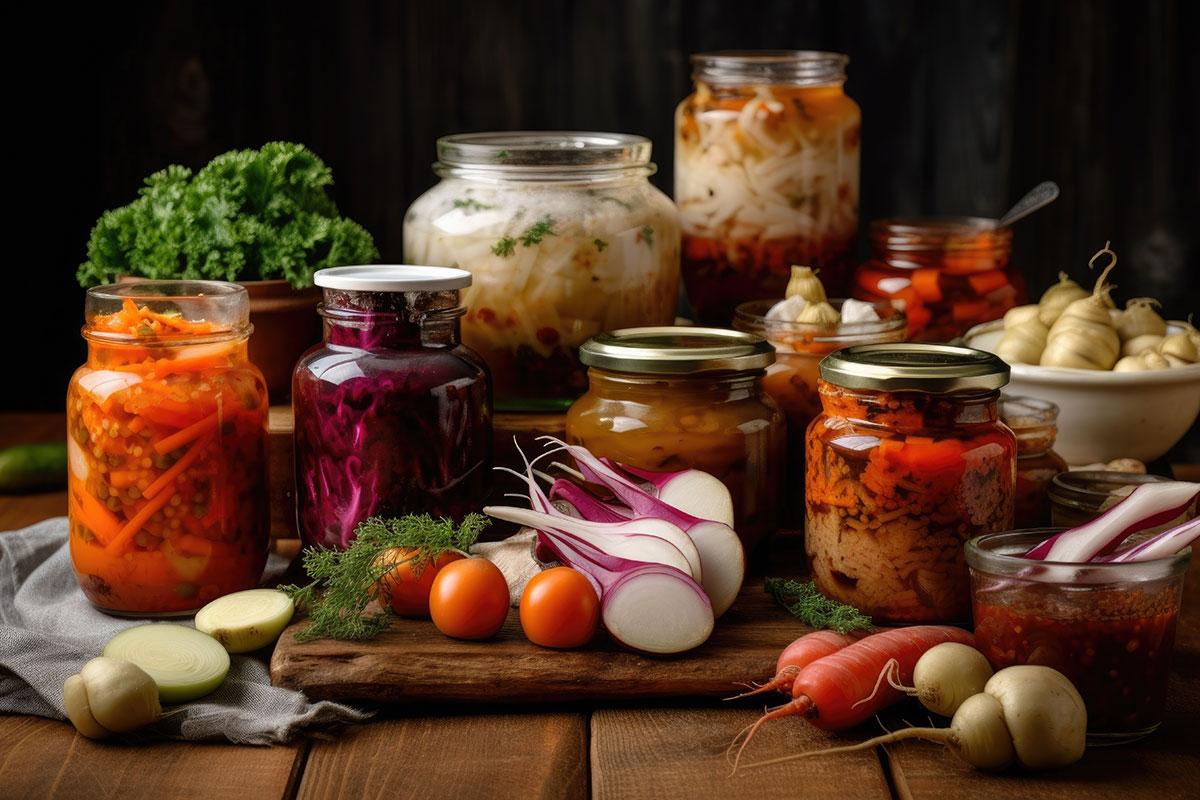In the bustling world of health and wellness, a quiet revolution is taking place in our kitchens and dining rooms. As we delve deeper into the mysteries of the human body, the gut microbiome has emerged as a key player in our overall health. At the heart of this revolution lies an ancient culinary practice that is as delicious as it is beneficial: fermentation. This transformative process, which has been used for centuries across cultures, is now celebrated for its remarkable ability to enhance gut health. In this article, we embark on a flavorful journey to explore the best fermented foods that not only tantalize the taste buds but also nurture the microscopic community within us. From the tangy bite of sauerkraut to the effervescent fizz of kombucha, discover how these time-honored staples can help harmonize your inner ecosystem and invigorate your well-being.
Exploring the Tangy World of Fermented Delights
Delve into the intricate flavors and health benefits of fermented foods, which are known to bolster your gut microbiome. These culinary treasures not only tantalize the taste buds but also play a pivotal role in maintaining digestive harmony. A vibrant gut ecosystem is essential for overall well-being, and these fermented delights can help nurture it:
- Kefir: A creamy, tangy drink made from fermented milk, kefir is packed with probiotics that can enhance gut flora diversity.
- Kimchi: This spicy Korean staple is teeming with beneficial bacteria, thanks to its fermentation process, and is known for its unique combination of flavors.
- Sauerkraut: Fermented cabbage that offers a delightful crunch and a wealth of probiotics, helping to improve digestion and support immune function.
- Miso: A Japanese fermented soybean paste that adds umami depth to soups and sauces, while providing a dose of beneficial microbes.
- Kombucha: This effervescent tea drink is fermented with a symbiotic culture of bacteria and yeast, offering a refreshing way to support gut health.
Embrace these fermented foods to not only elevate your culinary experiences but also to foster a thriving microbiome. By incorporating these gut-friendly options into your diet, you’re taking a flavorful step towards improved health.

Unveiling the Science Behind Fermented Foods and Gut Health
Delving into the world of fermented foods is akin to unlocking a treasure trove of benefits for your gut microbiome. These foods are not just delicious but also teeming with probiotics that can help balance your digestive system. Some of the most potent fermented foods include:
- Kimchi: This spicy Korean staple is packed with lactic acid bacteria, which are known to support gut health. Its rich blend of vegetables and spices offers a flavorful way to enhance your diet.
- Kefir: Often referred to as a drinkable yogurt, kefir is a powerful probiotic beverage that boasts a diverse array of bacteria and yeast, contributing to a robust and healthy gut environment.
- Sauerkraut: Made from fermented cabbage, sauerkraut is a crunchy, tangy addition to meals, providing both probiotics and a boost of vitamins C and K.
- Miso: This Japanese seasoning paste made from fermented soybeans is not only versatile but also a rich source of probiotics, essential for maintaining gut flora balance.
Incorporating these foods into your diet can be a delightful journey toward better gut health, offering not only diverse flavors but also a symphony of microorganisms that harmonize to enhance your well-being.
Top Fermented Foods to Transform Your Gut Microbiome
- Kefir: This tangy, probiotic-rich drink is a powerhouse for gut health. Made from fermented milk, kefir is packed with beneficial bacteria and yeast that work harmoniously to enhance digestion and boost your immune system. Its versatility allows it to be enjoyed in smoothies, cereals, or simply on its own.
- Kimchi: A staple in Korean cuisine, kimchi is a spicy, fermented cabbage dish that not only adds a zesty kick to your meals but also introduces a wide variety of probiotics to your gut. It’s rich in vitamins A and C, and its fermentation process helps break down nutrients, making them easier for your body to absorb.
- Tempeh: Originating from Indonesia, tempeh is a fermented soybean product that serves as a great plant-based protein source. The fermentation process not only enhances its digestibility but also increases its nutrient profile, offering gut-friendly benefits and a savory, nutty flavor to your dishes.
- Sauerkraut: This classic German side dish, made from fermented cabbage, is an excellent source of probiotics and fiber. Sauerkraut aids in digestion and supports the growth of beneficial gut bacteria, making it a delicious and healthful addition to sandwiches, salads, or as a tangy condiment.
- Miso: A traditional Japanese seasoning, miso is created by fermenting soybeans with salt and koji. It’s not only a flavorful addition to soups and marinades but also an effective way to introduce a variety of probiotics into your diet, promoting a balanced and healthy gut microbiome.

Incorporating Fermented Foods into Your Daily Diet for Optimal Benefits
Adding fermented foods to your diet can be a flavorful and easy way to enhance your gut health. These foods are rich in probiotics, which are beneficial bacteria that can improve digestion and strengthen the immune system. Some excellent options to consider include:
- Yogurt: A popular choice, yogurt is made from milk fermented by lactic acid bacteria. Look for varieties with live and active cultures for the most benefits.
- Kefir: This tangy, drinkable yogurt is packed with a diverse array of probiotic strains, making it a powerhouse for your gut.
- Kimchi: A staple in Korean cuisine, kimchi is a spicy fermented vegetable dish, typically made with cabbage and radishes, that is rich in vitamins and probiotics.
- Sauerkraut: Fermented cabbage with a tangy flavor, sauerkraut is not only a great source of probiotics but also high in fiber and vitamins C and K.
- Miso: This fermented soybean paste is often used in soups and sauces. It provides a savory umami flavor along with probiotics and essential nutrients.
Incorporating these foods into your daily meals can be as simple as adding a spoonful of kimchi to your salad, enjoying a kefir smoothie, or using miso in your cooking. With a variety of textures and flavors, these fermented delights can seamlessly blend into your routine, offering a tasty route to a healthier gut.

